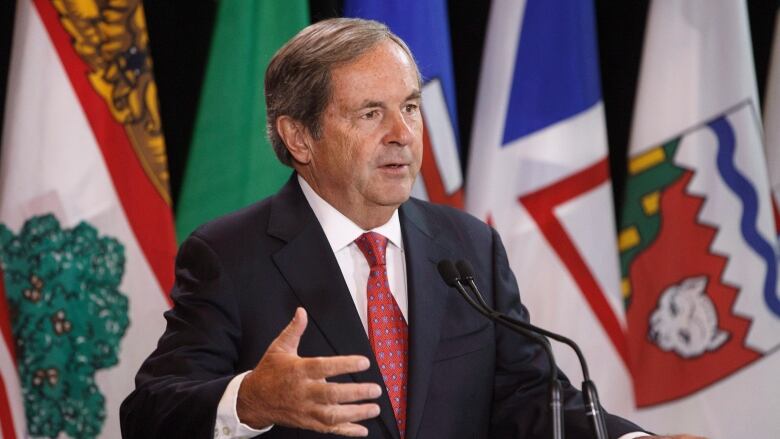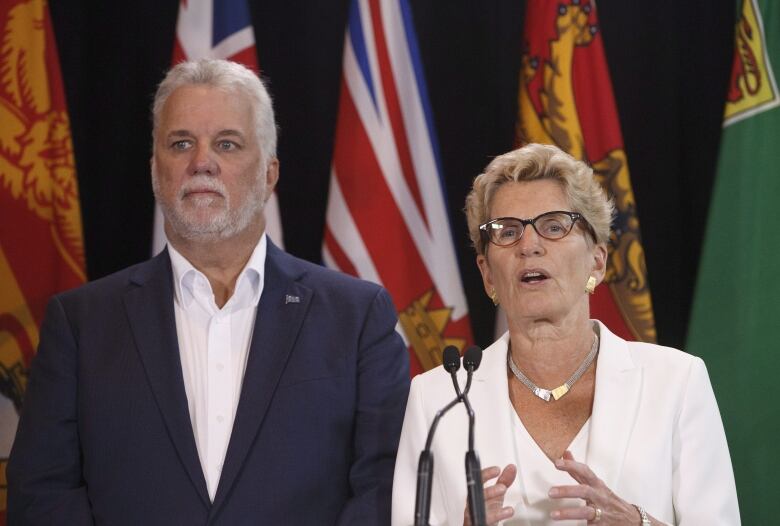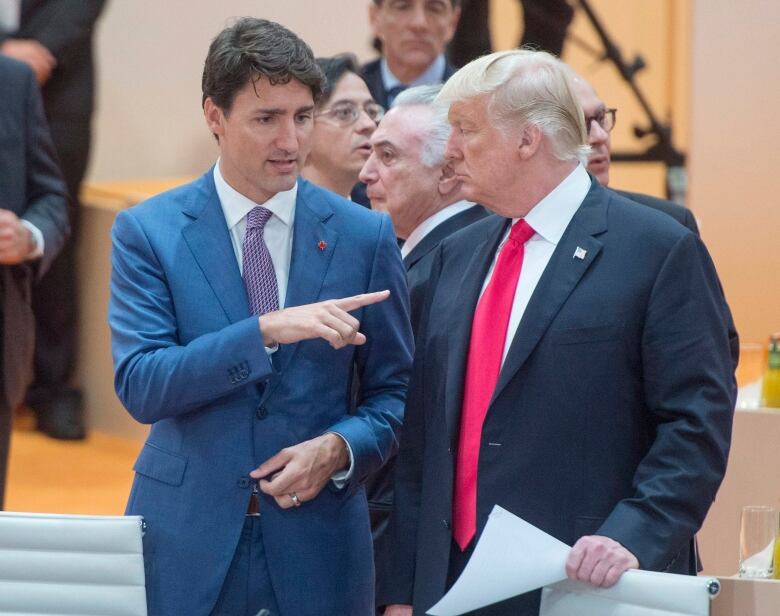Canada's U.S. ambassador says there will be no rush to sign 'bad deal' in new NAFTA
David MacNaughton briefed the Council of the Federation in Edmonton today

Canada's top diplomat in Washington says a quick deal to revamp NAFTAwill help calm investor uncertainty, but negotiators won't rush the process and windup witha "bad deal."
Ambassador to the U.S. David MacNaughtonmet with premiersin Edmonton today to offer strategic advice on dealing with President Donald Trump's administration after the U.S. unveiled its wish list for a historic overhaul ofNAFTA.
MacNaughton, who's on the front lines to renegotiate the North American Free Trade Agreement, helpedprovincial and territorial leaders unpack adocument released Monday by the Republican administration. The document outlineskey objectives in renegotiating the 23-year-old trade pact.
MacNaughtonsaid while it is important that negotiations don't drag on too, Canada will ensure its best interests are addressed.
"Obviously if we could get a clarification on the trading relationship sooner rather than later it would be better, but having said that we're not going to rush in to a bad deal," he told reporters in Edmonton.
- Trump reveals goals ahead of NAFTA talks
- Trudeau urges governors to stand with Canada on trade
- Trade,Trump and the race for new pot rules top agenda for premiers' meeting
MacNaughtonsaid there were no real surprises in the "laundry list"released yesterday, which he described as an opening position paper in what will be a long negotiating process.While he would not negotiate in public, the ambassadordid say it is critical to have a dispute resolution mechanism in place.
The18-page summaryreleased by U.S. Trade Representative RobertLighthizersketches out how the U.S. hopes to eliminateNAFTA'sChapter 19dispute resolution panels, which Canada uses to appealduties on softwood lumber and other goods, and is expected to be athorny issue when talks begin as early as Aug. 17.
After today's meeting, Alberta Premer Rachel Notley said the premiers committed to a continued collaborative approach to getting the best NAFTAdeal possible.
"We all pledged to work closely with the federal government to secure a deal that reflects our nation's interests," she said. "All premiers expect to be involved at every stage as these talks unfold," she said.
Notleysaid the provinces are committed to working collectively to overcome contentious issues.
Outreach strategy
Premiers have been part of Canada'sbroad outreach strategy, meeting with state governors and Congressional leaders in an effort to make their interests clear to thosein a position to influence the talks.
Quebec Premier Philippe Couillard said with such a broad, wide range of issues on the NAFTA table, it could take years to find a formal resolution.

"Anybody who tries to tell you that all this could be settled in a matter of weeks or months is totally not realistic at all. It's impossible," he said, noting that Mexico's election next year could also have a political impact on the negotiations.
Couillard said it could be possible to have a high-level agreement in place before getting down to technical talks.
Ahead of the three-day Council of the Federation meeting, which opened Monday, some premiers had stressedthe need to take a unified approach in demanding input as the federal government openstalks with the U.S. next month.
Ontario Premier Kathleen Wynne said both sides must be careful to keep the areas that are working intact. She said it's too early to tell what areas could be quickly negotiated and where some disputes could be drawn out.

With nine million jobs in the U.S. directly linked to trade with Canada, which is the largest export customer for30 states, New Brunswick Premier Brian Gallant said he feels "relatively confident" Canada is on solid footing heading into the NAFTA talks.
"I believe once we make that point once again, it's going to make our positioning on the negotiations that much stronger," he said.
Strong bargaining position
Gerry Baier, political scientist at the University of British Columbia, said it is beneficial for thepremiers to take a united front.
But he warned the cohesion could weaken if each province ultimately looks to protect its own sectors and industries when it comesto concessions to get a deal.
"There is a potential for divide and conquer," he said.
As for what's at stake politically for Trudeau, Baier said the prime minister will likely be able to deflect any criticism by pointingthe finger at Trump.
After discussingNAFTA, softwood lumber and other Canada-U.S. trade issues, the premiers will take on domestic economic and other issues Tuesday.
Legalizing pot talks
On Wednesday, talks turn to justice concerns. Premiers will take stock of the fallout from the Supreme Court of Canada's controversial Jordan decision, which imposed hard targets for criminal trials, and left provinces and territories scrambling for ways to ease delays in their court systems.
The federal government's plan to pass a law legalizing marijuana by July 2018 will also be on the agenda, as premiers share ideas on age of access, where to sell and distribute cannabis, and how to ensure public and road safety.












_(720p).jpg)


 OFFICIAL HD MUSIC VIDEO.jpg)
.jpg)



























































































